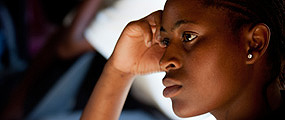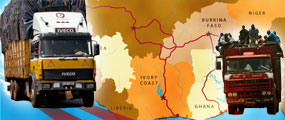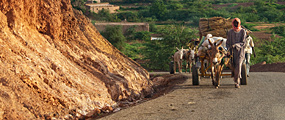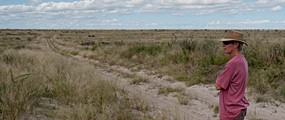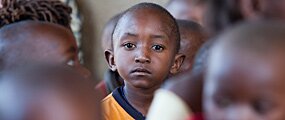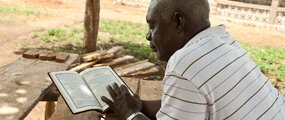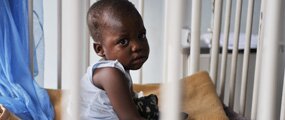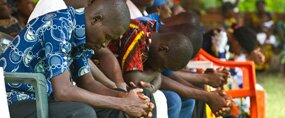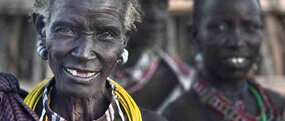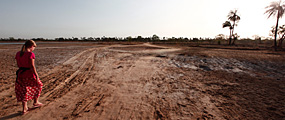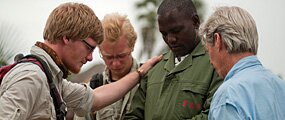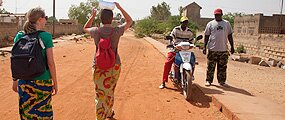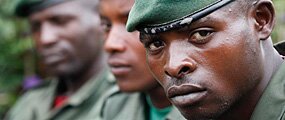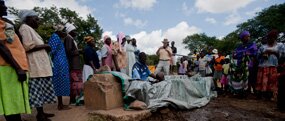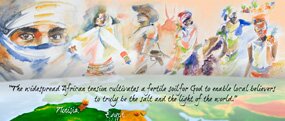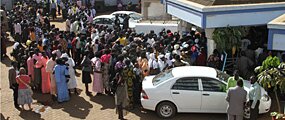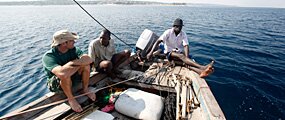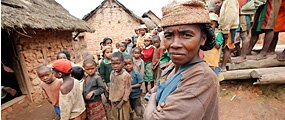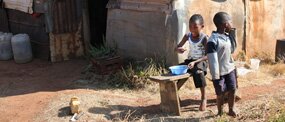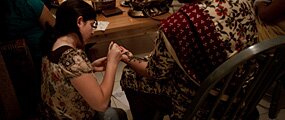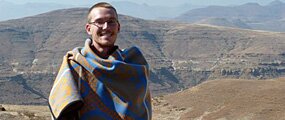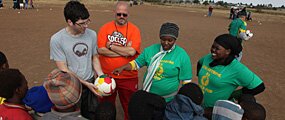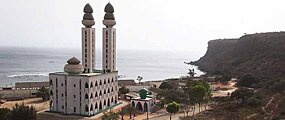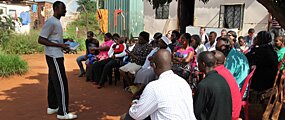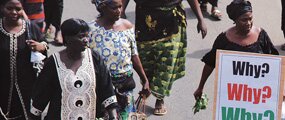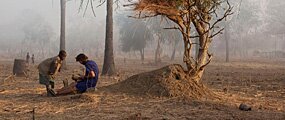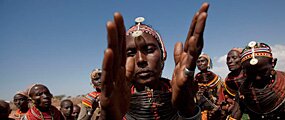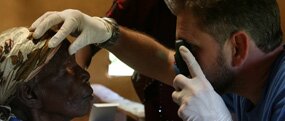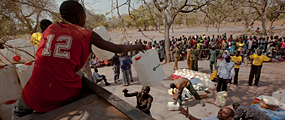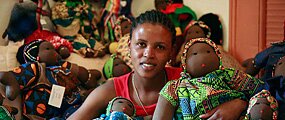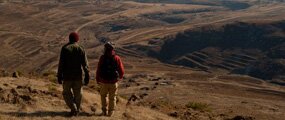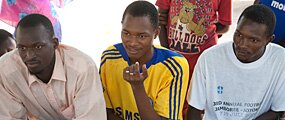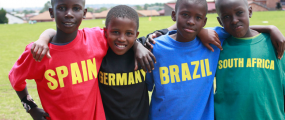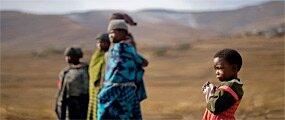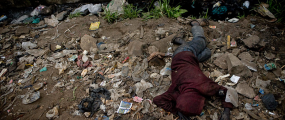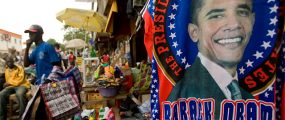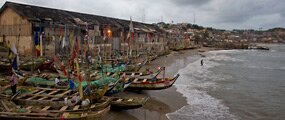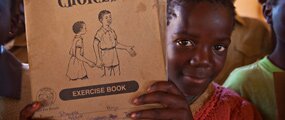Caught in Crossfire
Posted on April 7, 2010
GOMA, Democratic Republic of the Congo – Eight soldiers gather on a small compound to tell of their lives as rebel fighters. At first their stories are sketchy, almost as if they had been rehearsed. “I did bad things,” one says. Another echoes the same line.
After awhile, however, they begin to open up and share details of their sordid past. One nervously fidgets with his AK-47 as they talk. “I murdered people, and I raped women,” he says, “and I enjoyed it.”
 Others reflect his sentiments. “I raped, killed and stole from people,” another says, quickly followed by a third: “I killed and raped. I loved being drunk and raping women. I have even killed children.”
Others reflect his sentiments. “I raped, killed and stole from people,” another says, quickly followed by a third: “I killed and raped. I loved being drunk and raping women. I have even killed children.”
Their faces bear evidence of the seriousness of what they have done. The piercing gaze of several could certainly instill fear in an intended victim. “I really didn’t think about what I was doing,” one says. “I was just doing what I thought I should do as a rebel.” It is obvious, however, they struggle with what they have done.
This war in eastern Congo – a spillover from the Rwanda genocide of 1994 – has been called the deadliest conflict since World War II. In Rwanda the clash was quick and deadly: a reported 1 million people slaughtered in just 100 days. In the Congo it’s more like a slow burn: 5.5 million people killed since the atrocities in Rwanda. The world was shocked about Rwanda. It knows little about the Congo.
Sometimes it is hard to tell why people are fighting and with whom. Tribal hatred, a desire for power, and control of the region’s mineral wealth all play into it. Numerous rebel factions, Congolese government forces and an international network of financial backers are involved. As a result, millions of Congolese are now refugees, having fled the atrocities committed by all sides. Murder, looting and rape are rampant. Government troops and rebel fighters converge on a village, and the people are caught in the middle. They become victims of stray bullets and deliberate atrocities.
Tragic stories
Thirty miles outside of Goma sits the village of Sake and, within it, Mizeituni Baptist Church. This is about as far as one can go without encountering overt and dangerous rebel activity. But it hasn’t always been as “safe” there as it is today. In fact, less than a year ago, this was openly hostile territory. At the church, members gather to tell how their village was caught in the crossfire between government and rebel fighting.
In one section of the church sits a woman in her seventies. She walks with the help of a wooden staff. As she begins her story, the elderly woman talks in generalities. Then she motions for the interpreter to come, and she whispers in his ear. “We need to clear the room,” the interpreter announces. Then he quietly says, “This woman was raped by rebel soldiers, and she’s never told anyone before. She’s been too embarrassed and too ashamed to let anyone know.”
Those sitting around on the church’s old wooden benches go outside. Doors close and the windows are shuttered. In the darkness of the rustic building, the woman’s story slowly unfolds.
 “When the rebels and the government soldiers came, many people began to run, but I stayed at my house,” she says. “I was not able to run away with the rest due to my weak, ailing body, so I hid in the house under the bed, but they knocked down the door, dragged me from under the bed, took me into the bush, tied me up and raped me. The rebels told me not to tell my husband, that my husband would not understand and would be angry with me. So I just returned to my home and did not say anything. Now I have found that I have been infected with a venereal disease, and I am very angry and sad.”
“When the rebels and the government soldiers came, many people began to run, but I stayed at my house,” she says. “I was not able to run away with the rest due to my weak, ailing body, so I hid in the house under the bed, but they knocked down the door, dragged me from under the bed, took me into the bush, tied me up and raped me. The rebels told me not to tell my husband, that my husband would not understand and would be angry with me. So I just returned to my home and did not say anything. Now I have found that I have been infected with a venereal disease, and I am very angry and sad.”
After church members file back in, another tells her story. “I saw friends being shot and had a good friend who was shot but survived,” she says. “I saw rebels grabbing women and heard that they were raped. I just kept running and followed all the others who were trying to get away. I finally reached the refugee camp. It was a Baptist church on the road near Goma.”
The church-turned-camp, Baraka Baptist Church, is a refuge for the hurting. The stories told there are hauntingly similar to those of Sake village.
One refugee recalls, “I was living in the village, and I saw soldiers coming from both directions. I saw people falling down, and I began to run. After hearing the shooting and seeing people dying, I grabbed my wife and children and began to run toward Goma. I finally arrived at the church here. I had heard that it was also a refugee camp and that there might be food and shelter here.”
Compassionate pastors
Athanace Habimana was distressed over all he saw and experienced concerning the conflict in eastern Congo. He is pastor of Hekima Baptist Church in Goma and head of the Baptist Union of East Congo.
“Since 1993, the war in Rwanda and the Congo has caused great stress on us as we were going out to reach people,” he says. “But because we had a compassionate heart, we wanted to get out among the people. This included the rebels. We wanted them to know that we are all created by the same God.”
With the help of IMB missionary Rusty Pugh, Habimana developed a strategy to reach the rebels.
“Habimana shared with me a dream to have a ministry to go into the rebel camps and witness to the rebels,” Pugh says. “Later that year we did training with seven pastors, using [Bible] storying. We decided that the pastors would go into the camps for two weeks sharing Christ and using storying to reach the rebels.”
Pastor Pascal Ndiho coordinates this dangerous ministry. “Without the permission of the commanders, we are not allowed to go and reach the rebel soldiers,” he says. “We must identify ourselves as servants of God and that we are there to share the wonderful news of Jesus Christ. We show them the advantages of being in Christ and that with their help we can reach out to all the rebel soldiers.”
When the rebel commanders are convinced that the pastors are not government spies, but are truly there for the spiritual well-being of their troops, they are happy for the pastors’ visits. Somehow, they believe this gesture provides them respectability. Many are committed to a specific ideology and want their soldiers seen as a legitimate army rather than a band of rogues.
 “It is so exciting to see what has been happening as these pastors have been faithful in their going and sharing with the rebels,” Pugh says. “They have started small storying groups among the rebels, and because the rebels are always moving, new groups have been formed by the rebels that were trained by the Goma pastors. So the groups are multiplying.”
“It is so exciting to see what has been happening as these pastors have been faithful in their going and sharing with the rebels,” Pugh says. “They have started small storying groups among the rebels, and because the rebels are always moving, new groups have been formed by the rebels that were trained by the Goma pastors. So the groups are multiplying.”
To date over 500 rebels have been baptized, including the eight who sat in the Goma compound. As they describe how Jesus transformed their lives, their countenances change from ones to be feared to ones at peace with their new life in Christ. Their eyes shine, their faces light up and smiles easily come to their lips. Evident is a joy that only Christ can give, along with an awareness of an undeserved forgiveness.
“We try not to think about what we did, to remember, but it is hard,” one confesses. “We know that we have hurt many people and have a lot of sin. But it is very different now.”
The soldier who admitted to enjoying the atrocities he committed adds: “The difference is that before I did not know God. What I did, I did for me. Now I know that I committed so many sins, and I feel very guilty. But the pastor said that God can forgive me, and I had never heard about this before, but now I know I can be forgiven because of Jesus.”
Another says: “I felt so good when I was able to accept Christ. It was the happiest day of my life.” There is a sense of relief, even release, in their voices.
New life in Christ
The eight now serve as an elite security detail for a government army colonel in Goma. He is an active member of Hekima Baptist Church. Not only are the  former rebels growing in their newfound faith, but they are reaching out to their rebel colleagues and sharing the Gospel with them. One of them is even a military chaplain, and several have sought forgiveness from those they victimized.
former rebels growing in their newfound faith, but they are reaching out to their rebel colleagues and sharing the Gospel with them. One of them is even a military chaplain, and several have sought forgiveness from those they victimized.
At least one victim, however, still struggles with what happened to her. She is the elderly woman who was raped in her village 30 miles from where the eight former rebels are gathered, the woman who confessed to being “very angry and sad.” She struggles with the idea that God could love those men who hurt her. He might be able to forgive them, “but they are still very bad men.” Could she forgive them? “If I was able to meet them, I could forgive them,” she says, “but they should be put in jail for what they did to me.”
Life is a struggle for those living in eastern Congo, especially for those caught in the crossfire of conflicting ideologies and the flying bullets of opposing armies. It is even a struggle for those who contemplate the power of the cross over that of an AK-47.
One thing is certain, though: “When God looks down on the rebels with His compassionate heart, He sees His children, and He wants all of His children to be saved,” Ndiho says. The same is true for victims as well.




